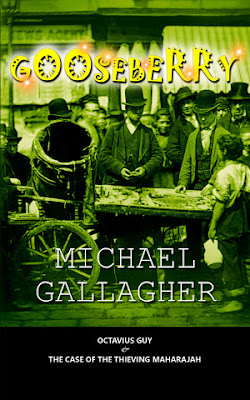My reviewer criteria. I like light, entertaining novels. I like smaller scale stories rather than epics. I like character focused novels featuring pleasant characters, with a minimum number of unpleasant ones. I greatly value clever and witty writing. I like first person, or close third person narratives. I dislike a lot of "head jumping" between POVs and flashbacks. I want a story, not a puzzle. While I am not opposed to violence, I dislike gore for the sake of gore. I find long and elaborate fight, action, and battle sequences tedious. Plot holes and things that happen for the convenience of the author annoy me. And I fear I'm a born critic in that I don't mind pointing out what I don't like in a story. However, I lay no claim to be the final arbitrator of style and taste, you need to decide for yourself what you like or dislike in a book.
Your opinions are always welcome. Comment below.
Gooseberry is the first book in the Send for Octavius Guy Series, comprising four books. It features the 14 year old title character Octavius "Gooseberry" Guy as a former pickpocket now an attorney's errand boy/detective. The character was a minor character in Wilkie Collin's Victorian story The Moonstone, along with some other characters from that story. The story is set in 1850's London.
The plot concerns an attack by a street gang of children, and a mysterious photograph that is found in the purse of one of the victims of the attack after they get home. What follows is a long and convoluted plot that I'll not even try to summarize.
The story was first written as a weekly serial posted on Goodreads in 2014. It was written as a serial in the spirit of how The Moonstone and other novels of the period were published. It shows. I say that because I found the plot to be rather meandering, unfocused. Mr Gallagher says that he was inventing, and writing it, as he went along, and that shows. It's not incoherent, or anything like that, it's just that it rambles along from one little mystery solved to the next little mystery, without a sense of an over arching structure to the story. At least I felt that way, and as a result, I found myself forcing myself to pick up the story again, and again. I never quite got into it.
I think this story also illustrated the difference between an old story written as a contemporary tale, and a contemporary written story of the past. Take the Sherlock Holmes stories which were written in a contemporary setting. Doyle felt no need to explain the Victorian world to the readers. And yet, somehow, readers a hundred plus years later can still follow and enjoy them without getting lost. (Though, of course, you can buy all sorts of books that fill out that world, if you care to.) On the other hand, you have this story, or for that matter, that other Victorian mystery I read a while back, where the authors see a need to explain just about everything about 1850 London to the modern reader. The author here does a pretty good job of inserting all his research into the story - it is a first person narrative, so you have the narrator explaining perhaps things that may be unfamiliar to modern readers, as they become relevant, unlike that other book where the author just shoved in incidental information and history lessons into the narrative willy-nilly. In both cases, I feel that all this information detracts rather than enhances the authenticity of the place and time. Authors should, by all means, avoid the use of modern terms and language and use the historically correct terms and phrases. Give the readers credit for figuring things out by themselves by context or experience in other books.
So those are my two main criticisms - the story seemed unfocused for a mystery, and it lacked, for me, a sense of authenticity. However, the final straw for me was the fact that the ending was, well, just too far over the top - too unbelievable in that it included the unbelievable appearance of a major historical character. That, and the fact that it had an epilogue that just dragged on and on. I ended up skipping the entire epilogue. By that time I didn't care about the story any more.
All in all, not a bad story, just not one for me. You might like it, and its sequels. They're free ebooks in 2024 on Smashwords, so it costs you nothing to give them a try. And remember I'm only offering my opinion. And even with my complaints, I've given the book an average score, this, despite the cover's ugly green color and dopy typeface for the title.




No comments:
Post a Comment